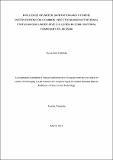| dc.description.abstract | Under-nutrition and common infections among children aged below five years in semi-pastoral communities of northern Tanzania could be contributed by poor water, sanitation and hygiene (WASH) practices. The burden of these practices to the health of children under-five years seem to be given less consideration and much focus is on curative measures, vaccination and food supplementation. WASH interventions have been reported elsewhere to reduce the problems of under-nutrition and common infections among this age group. However, no any WASH intervention done in semi-pastoral communities to reduce the problems of under-nutrition and common infections among children under-five years. This study assessed the influence of WASH interventions on common infections and nutritional status among children under-five years in semi-pastoral communities of Arusha, Tanzania.
The study reviewed hospital attendance registers from Monduli and Longido District hospitals for year 2013 to 2015 to identify the existing trends of common infections among under-five children, followed by a household survey where a total of 310 mother-child pairs were randomly selected and data on child morbidity, WASH practices, cultural and socio-demographic characteristics was collected through facilitated interviews. Anthropometric measurements and hemoglobin levels of under-five children were taken. Thereafter, participants from Longido District were divided into intervention and control groups. The intervention group was provided with WASH package consisting of health education and nano-filters for filtering drinking water. The control group continued with their normal WASH practices. After six months follow up, assessment to determine the effectiveness of the interventions on diarrhea prevalence and nutritional status among under-five children was done. Samples of fresh milk ready to feed children and drinking water from storage containers were also tested to see status of E. coli in samples from the two groups.
About two third of under-five patients attended the hospitals were suffering from infectious diseases. Household survey revealed that 87% of respondents did not have toilets and 96% of those with no toilets were practicing open defecation. About 12% of respondents reported washing hands with soap during critical moments while 46% of respondents reported using unsafe surface water for domestic purposes. Again, 31.6% of under-five children were stunted, 61.2% were anemic while 15.5% had suffered from diarrhea two weeks preceding survey. Children fed on complementary foods kept in calabash/kibuyu (p < 0.001) had increased risk of suffering from diarrhea. Use of surface water for domestic purposes was
ii
strongly associated with diarrhea, stunting and/or under-weight (p < 0.001). After intervention, incidences of diarrhea (p = 0.03) and rate of underweight (p = 0.02) were significantly reduced among under-five children when compared to those from the control group.
Conclusion: Use of surface water for domestic purposes, storage of complementary foods in calabash/kibuyu, and lack of formal education among mothers of under-five children were found to contribute significantly to diarrhea and under-nutrition among this participant population. This study highlights the need for health education promotion and treatment of drinking water at the point of use to address the problems of under-nutrition and common infections among children under-five years in semi pastoral communities and similar settings. | en_US |

